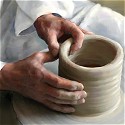|
Our Torah portion this week describes how God hardened the heart of Sihon, king of Chesbon, in order to bring about his destruction (Deut. 2:30). Like the Pharaoh who stubbornly refused to heed the message of God's salvation, the LORD "hardened Sihon's spirit" (כִּי־הִקְשָׁה יהוה אֱלהֶיךָ אֶת־רוּחוֹ) so that he would not yield to the purposes and plans of God. Notice that the Hebrew word translated "hardened" (i.e., hikshah) here is the same word used to describe how Pharaoh's hardness of heart caused the death of the firstborn in Egypt (Exod. 13:15). For more on this subject, see Parashat Bo: "Hardening of the Heart."
People who do not know God are described as those who "walk in the futility (ματαιότης) of their minds" (Eph. 4:17). "They are darkened in their understanding, alienated from the life of God because of the ignorance (ἄγνοια) that is in them, due to their hardness of heart" (Eph. 4:18). This hardness of heart leads to a state of callousness or apathy (ἀπαλγέω, lit. the "inability to feel"), which is the very opposite of empathy or compassion (Eph. 4:19). Notice the progression of this process. People are darkened in their understanding and alienated from the life of God because of the ignorance that comes from having a hardened heart. Put the other way around, having a hardened heart leads to ignorance, alienation from the life of God, darkened understanding, and a "futile" mind... But notice that the heart of man is central (Prov. 4:23) because it determines the "issues of life." It is the heart (לֵבָב), or the "inner man," that determines what to acknowledge and what to ignore (i.e., ignore+ance). Indeed, salvation itself is a matter of believing the truth of the gospel message from the heart (Rom. 10:9).
A heart that is insensitive, indifferent, unfeeling, and callous toward the needs of others is regarded as "hard." Both Pharaoh and Sihon refused to empathize with the suffering of the Jewish people and thereby they became enshrouded in darkness. The darkness within them led to cruelty which further alienated them from the life of God due to their willful ignorance.
Sometimes hardness of heart comes as a result of living in a fallen world. Many people live with abiding "scar tissue" that surrounds their heart, making them feel numb and unwilling to open up and trust others. Their affections have become disordered and their ego rationalizes blaming others or seeking various forms of entitlement. "Turning off your heart" can mean suppressing any positive regard for others (empathy) while nurturing anger and self-righteousness, or it may mean withdrawing from others as a lifeless shell (both approaches vainly attempt to defend the heart from hurt). Although Yeshua always showed great compassion, especially to the wounded and broken in spirit (Isa. 42:3), He regularly condemned the "hardness of heart" ("sclero-cardia," σκληροκαρδία) of the self-righteous and religious types who were opposed his work of healing and love. Such indifference toward the suffering of others caused Yeshua to feel grief (Mark 3:5). Did not the Torah explicitly state: לא תְאַמֵּץ אֶת־לְבָבְךָ / "you shall not harden your heart" against your poor brother (Deut. 15:7)? How much more should a man not "put away" his wife? Moses was forced to "change" the original intent of the Torah regarding the question of divorce as a concession to the hardheartedness of sinful men (Matt. 19:3-9).
Perhaps the telltale sign of having a hard heart is the refusal to listen (i.e., obey) God's word. The LORD said to the prophet Ezekiel: "But the house of Israel will not be willing to listen to you, for they are not willing to listen to me: because all the house of Israel have a "strong forehead" (חִזְקֵי־מֵצַח) and a "hard heart" (קְשֵׁי־לֵב) (Ezek. 3:7, Cp. Jer. 5:23; 7:24). A hard heart has a form of "sclerosis" that makes it closed off and impermeable to love from others, and especially from God. Scripture uses various images to picture this condition, including a "heart of stone" (Ezek. 36:26, Zech. 7:12), an "uncircumcised heart" (Jer. 9:26), a "stiff neck" (Deut. 31:27), and so on. Stubbornness is really a form of idolatry, an exaltation of self-will that refuses to surrender to God.
For example, in the aftermath of the grievous Sin of the Golden Calf, the LORD threatened to wipe out the Jews because they were am k'she oref (עַם־קְשֵׁה־ערֶף), a "stiff-necked people" (Exod. 32:9). Various explanations for this term have been given, including the medieval commentator Sforno's description that a "stiff necked person" is someone who mulishly refuses to "move his head" and listen to those attempting to guide and help him. The neck, after all, is the "corridor" between the head and the heart, and having a "stiff neck" suggests an inflexible way of thinking and feeling... The rebels who enticed Aaron to create the golden calf were certainly "stiff necked" and obstinate. Despite witnessing the great miracles of the Exodus and experiencing the awesome revelation at Sinai, they obstinately insisted that Aaron make them "gods" that would return them to the "fleshpots of Egypt." Now that's some kind of chutzpah!
Later, Moses appealed to the people to "circumcise the foreskin of your heart, and be no more stiff-necked'" (Deut. 10:16). This metaphor pictures removing a hard, outer covering so that the heart is "opened up" to feel once again. God wants us to experience compassion (com+passion: "feeling-with") and sympathy for other people's suffering... Heart circumcision represents a radical turning away from the insular realm of the self toward the emotional realm of others and God. The LORD wants us to open our hearts to the needs of other people in our lives. Indeed, the "law of the Messiah" (תּוֹרַת הַמָּשִׁיחַ) is to bear one another's burdens (Gal. 6:2).

Can believers in Yeshua have hard hearts? Yes, unfortunately, they can... When the disciples saw miracles, for example, they often did not understand because "their hearts were hardened" (Mark 6:52, 8:17). They had somehow "missed" the sense of awe, surprise, and wonder over the miraculous Presence of the LORD in their midst. They did not expect the miracles because their minds were made dull and unable to comprehend reality (John 12:40, Rom. 11:7, 2 Cor. 3:14, using the same Greek word, πωρόω). Yeshua linked this hardness to blindness, both physical and spiritual (John 12:40). Even after the resurrection, Yeshua rebuked his closest followers for their unbelief and hardness of heart (σκληροκαρδία), because they did not believe the testimony of Mary Magdalene and the other witnesses of His resurrection (Mark 16:11-14). The disciples somehow "forgot" Yeshua's repeated teaching that He must suffer, die, and be raised on the third day (Matt. 16:21; Luke 9:22).
Believers are furthermore warned not to become hardened (σκληρύνω) through the deceitfulness of sin (Heb. 3:13). Tolerance for sin causes the heart to become dull and deadened. Just as one mitzvah leads to another, so one sin leads to another... Allowing sin to go unchecked in your life (i.e., by "forgetting" to confess your sins) is to be under the influence of the "deceitfulness of sin" (ἀπάτῃ τῆς ἁμαρτίας). As Bonhoeffer wrote: "Silence in the face of evil is itself evil: God will not hold us guiltless. Not to speak is to speak. Not to act is to act."
In this sense, the deceitfulness of sin is really a form of self-deception (i.e., "fooling yourself"), since (by definition) sin requires the consent of the will to do its dirty business within the heart. When it comes to moral decisions, there really are no "accidental" sins. Can you imagine a man committing adultery and claiming that it was an "accident"? The deceitfulness of sin is also called the "lusts of deceit" (Eph. 4:22), from a Greek word (ἀπατάω) that means to be "cheated out" of something. Just as a hard heart refuses to see the miraculous Presence of God, so it refuses to see the danger of sin. Whether it disbelieves the miraculous in Yeshua or "winks at" the presence of sin, such hardness of heart inevitably leads to a sort of stupor or denial of reality. Such self-deception cheats you from living the life God calls you to live...
If we refuse to confess the truth about our inner condition to God in genuine humility, our correction may be prolonged through the process of further "hardening." Often we are not conscious of this process within ourselves, and then -- when we are made conscious -- we may find ourselves helpless to change our direction. This state of helplessness provides another opportunity for the heart to cry out to God for deliverance. If, however, we yet harden our hearts further, God may "give us over to a depraved mind" (ἀδόκιμος. lit. "tested to be found useless") that is no longer able to discern or resist the presence of evil (Rom. 1:28). This is a state of having an entirely dead heart and is the worst possible judgment from heaven. In this sense, the hardened heart is simply God's ratification of the will of the sinner. The sages wrote, "God leads men along a path which they themselves choose. If a man wants to be good, God leads him toward goodness; if he wants to travel an evil road, God helps him do that, too." According to their desires God rewards the wicked in this world and the righteous in the world to come. As C.S. Lewis once said, "There are only two kinds of people in the end: those who say to God, 'Thy will be done,' and those to whom God says, in the end, 'Thy will be done.'" "The heart of a man plans his way, and the LORD establishes his steps" / לֵב אָדָם יְחַשֵּׁב דַּרְכּוֹ וַיהוה יָכִין צַעֲדו (Prov. 16:9).
If we cry out to the LORD for salvation, He has promised to hear us (Rom. 10:13, Joel 2:32). The awareness that we are hardhearted and self-deceived can lead to a (blessed) sense of brokenness and despair -- i.e., to the realization that own self-sufficiency is futile and ultimately self-destructive. Turning to the LORD in despair of ourselves is a mark of humility. When we are emptied of ourselves, we are delivered from pride and self-deception and thereby enabled to truly ask for God's help... This is a miracle, since most of us have "a little Pharaoh inside," clamoring that we be the center of our universe and refusing to submit to the Presence of the LORD...
God wants us to have "soft" hearts that are malleable and subject to His touch and influence. Consider the Biblical analogy of a potter who works with clay (Isa. 64:8, Jer. 18:6). Hard clay is brittle and hard to work with, though soft clay can be molded and adapted for a variety of uses. Applied to our heart attitudes, soft clay represents being open and moveable, whereas hard clay represents being inflexible, intolerant, and so on. A "hard hearted" person is closed-minded, assured of his own righteousness, and unwilling to admit the possibility of being wrong. He is really a "fragile" soul who is often hidebound by traditions, unwilling to be corrected, and usually so driven by fear and suspicion that he is unable to look at other possibilities. When we find ourselves becoming rigid, inflexible, and intolerant, we may be demonstrating hardness of heart.

Hardness of heart is something all of us deal with, even those who believe in Yeshua. After all, believers are commanded to "put off the old self with its practices" (Col. 3:9) and are repeatedly urged not to harden their hearts (μὴ σκληρύνητε τὰς καρδίας) through unbelief (Heb. 3:8,15, 4:7). May God's love help us keep our hearts soft and open toward others... May He give us a new heart, and put a new spirit within us. May He remove the heart of stone (לֵב הָאֶבֶן) from us and give us a heart of flesh (לֵב בָּשָׂר). May we be lev echad (לֵב אֶחָד) - "one heart" - with one another and with the Father (Ezek. 11:19). May we be so sensitized to the Presence of God that we detect the slightest touch from His hand upon us. Amen.
|





